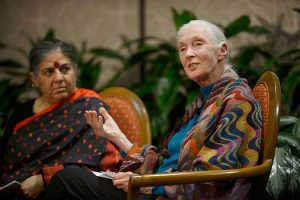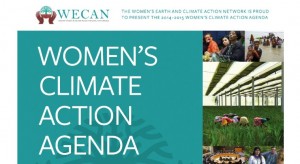Yes, We Can: Women Lead the Way on Climate Action
Sep 18th, 2014 | By admin | Category: Climate ChangeBy Suzanne York, www.howmany.org
Hopefully you’ve heard about this weekend’s People’s Climate March in New York City. It is being billed as the biggest climate rally in the U.S., taking place before UN Secretary Ban Ki-moon’s climate summit.
While there will be many organizations and diverse views being touted during the march, there is one that stands out above them all – understanding the impacts of a changing climate on women.
Creating a New Narrative
One small organization is working around the clock to raise awareness on women and climate issues. The Women’s Earth and Climate Action Network – WECAN – has just released its strategy for empowering women and urging leaders to halt global climate change. The Women’s Climate Action Agenda is a blueprint for coping with an increasingly erratic climate system and a vision of how women can lead the way to a socially just world.
More than 100 women leaders from around the world and from many different sectors (agriculture, economics, reproductive rights, nature’s rights and many more) contributed to this detailed proposal.
The Women’s Climate Action Agenda analyzes the root causes of environmental degradation and social injustice, ultimately presenting powerful recommendations and alternative solutions to the climate crisis. What makes it powerful is that it was drafted with input from women, for women. But ultimately, it is for the entire planet.
And who better understands the effects of extreme weather patterns? Women bear the brunt of climate impacts. They are the ones fetching water, harvesting crops, tending to livestock, taking care of their families. Studies have shown that women disproportionately suffer the impacts of disasters, severe weather events, and climate change because of cultural norms and the inequitable distribution of roles, resources, and power, especially in developing countries.
The WECAN action plan consists of the following (see the report for detailed descriptions):
- Stop further global climate change;
- Protect the Rights of Nature;
- Democratize food, agriculture, and seeds;
- Protect the rights of Indigenous Peoples;
- Transform extractive, unjust, status-quo economics into new, socially just and environmentally sustainable economics;
- Promote women’s rights and women’s leadership in all steps of climate change adaptation and mitigation.

Jane Goodall and Vandana Shiva at the 2013 International Women’s Earth and Climate Summit. [photo: Olivia Fine]
Ultimately, the Women’s Climate Action Agenda is about systems change – for women, men, and the planet. Business as usual has runs its course and the world needs a new, positive direction for societal and environmental well-being. We ignore the warnings to our own peril. Earlier this month the World Meteorological Organization warned that concentrations of carbon dioxide have increased at the fastest rate for 30 years in 2013, and experts warned that the world is “running out of time.”
We live in a world of over 7 billion people whose basic needs and wants must be met and where some overconsume resources at insatiable rates. And we share this world with nature, and nature is being exploited at unsustainable levels.
The women who put forth the Women’s Climate Action Agenda state our situation well, and the direction we should follow:
In order to live in harmony with the earth and safeguard and foster a healthy world for present and future generations, we need to reform the destructive aspects of our modern life. This means advancing a new economy, based on social justice and environmental sustainability that recognizes the rights of people, and the Rights of Nature, and keeps in mind the finite carrying capacity of the Earth. We need a just transition to a new, clean-energy economy. We need a paradigm shift—for global environmental sustainability, for social justice, for new economies of scale, and for conducting all human activities with respect and understanding of nature. All four of these factors are inextricably linked. We cannot bring one into stable being without tending to the others.
Suzanne York is a senior writer with the Institute for Population Studies and is part of the WECAN movement.

